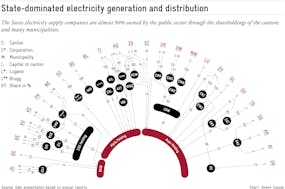The foreign and domestic shock triggered by the SNB’s decision to abandon the currency floor will have a negative initial impact across the Swiss economy. But, from experience, it may eventually come to be seen as positive. The biggest danger is that business, unions and employees will demand support measures. But weakening, or entirely eliminating, the pressure for structural changes and higher productivity prompted by the stronger franc would give away a big opportunity. Instead, the shock should be used to address long overdue reforms to boost competition, pare back the role of the state and remove regulatory shackles and bureaucracy.
The SNB’s step will remain controversial for some time. Was the timing right? Shouldn‘t it have waited a bit longer? Wouldn‘t the shift have been less painful if the floor had simply been adjusted, or a currency basket substituted for the direct euro link? Should officials have insisted to the very end the floor would be defended, only to abandon it at a stroke?
What’s clear is that everyone should have realised the policy of linking the franc to the euro would one day be discarded, because it was, from the very start, never intended to be permanent. The only uncertainty was the timing.
Pulling back from intervention is always painful
Instead, everyone continued in the somewhat unjustified – but at the time entirely comfortable – hope the central bank would not rock the boat, let alone capsize it. Withdrawing from an interventionist policy in a world of free markets is always painful, which is why measures, like the floor at the time, should only be introduced in the most extreme circumstances and for a strictly limited period. The false sense of comfort such measures often create is never good for a country’s competitiveness. Moreover, such policies almost invariably prompt political pressure on those involved to continue intervening.
That is why one aspect of ditching the link to the euro is particularly valuable: the SNB directorate’s decision proved its impressive political independence. In the 1970s, it became increasingly accepted in monetary policy that independent central banks were the best guarantors of lasting stability. The SNB required no words of approval from other monetary guardians like the ECB or the Fed. Instead, as in 1973, it again acted as virtual first mover. ((In January 1973, the SNB allowed the franc to float by terminating dollar purchases. The move to floating rates, prompting a swift appreciation of the franc, was within weeks followed by other leading European central banks ed.)) Of course, views were exchanged. But the decision was an autonomous one. The SNB didn’t even co-ordinate with the Federal Council, but only put the government in the picture a few hours before its public announcement. That’s how it should be, rather than one minister now feeling herself obliged to spell out in interviews what she thinks is an acceptable exchange rate.
The SNB proves its independence vis a vis public opinion
Above all, the SNB’s directorate demonstrated its independence vis a vis public opinion. It’s true some experts had already sketched scenarios for a gradual abandonment of the strategy, and argued in favour of the new approach, along the lines that a single painful shock was better than prolonging the agony.
But the great majority of business and industrial leaders, and the bulk of published opinion, argued against any abrupt policy shift. In such circumstances, swimming against the tide requires some courage, and mental, as well as institutional, independence. All credit to the SNB.
But the SNB cannot distance itself from one form of dependency – from the world’s financial markets. The central bank has gained autonomy, in the sense that it must now no longer intervene almost mechanically in the foreign exchange markets whenever the franc threatens to strengthen. But greater freedom doesn’t make life easier. The central bank’s task now is in a way more complicated than before, because it must constantly think about which currencies to take as benchmarks, and whether it should still try to influence the franc’s value or not. For the SNB too, greater independence means greater responsibility.
This article appeared originally, in slightly different form, in the Aargauer Zeitung of 22. Januar 2015.





